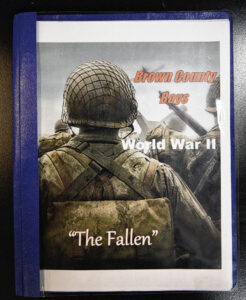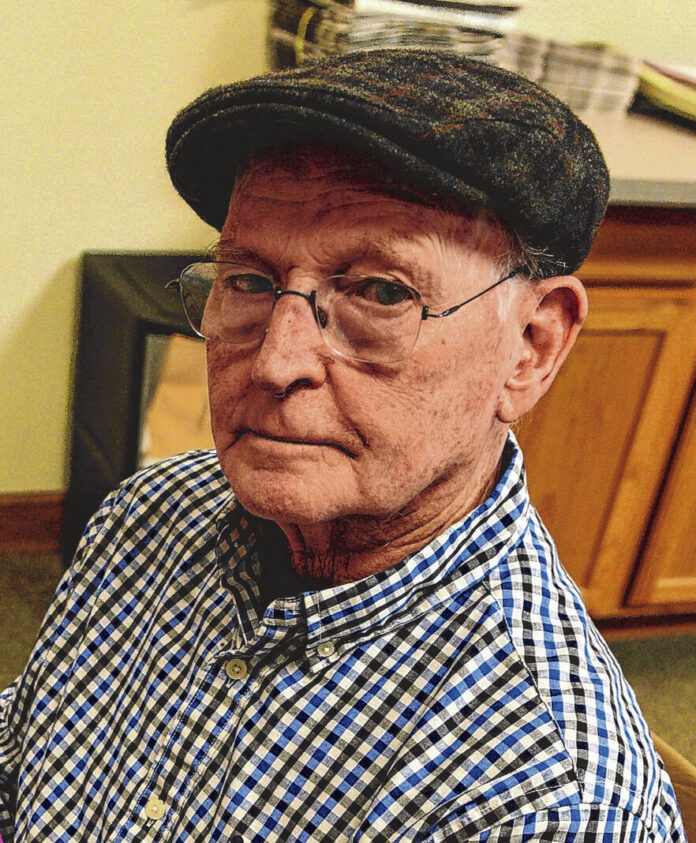By JIM WATKINS, guest columnist
April 1945 was the last full month of World War II in Europe.
The historical events of that month were the kind a person of that time would remember and reflect on for months, years and the rest of their lives. Happening that month were the death of President Franklin D. Roosevelt at Warm Springs, Georgia, the Allied liberation of Buchenwald and Belsen concentration camps and the suicide of Adolf Hitler.
For the Swift family of Hamblen Township their uppermost reflection in the Aprils that followed would be of the departed Clifford, their son and brother.
Pvt. Clifford Swift of the 8th Division, 13th Infantry had just turned 19 on Feb. 21, 1945. It was a very different birthday for Clifford. He was on board a troop ship making the short voyage across the English Channel to France. He and his fellow combatants would be heading to Germany’s homeland. There they would fight in some of the final battles to end Hitler’s 12-year reign of terror, considerably short of the fuehrer’s predicted “1,000-year Reich!”
The Swift family lived a couple of miles south of Nineveh. Two of Clifford’s brothers, Oddie and Paul, were also in the U.S. Army. Clifford had entered service soon after graduating high school in Helmsburg in June of 1944.
His training lasted until early December. At that time, he was able to come home to Brown County on furlough before heading overseas to Europe.
At this point in the war, it is most likely that Clifford would have fallen into the “Replacement” category. About half of the three million-plus men who served in the U. S. Army in the European Theatre of Operations came onto the continent as replacements. A substantial majority of these replacement soldiers headed to the front in the latter months of the European war. The front by this time had now advanced to the doorstep of Germany.
The entry into Germany was greatly facilitated by the sudden capture of the Remagen Bridge across the Rhine River. This was front-page news in American newspapers. This unexpected availability allowed Allied high commander Dwight Eisenhower (Ike) to alter his plans to end the war. The Allies were now able to rapidly transport five divisions across the Rhine into the Ruhr. The Ruhr region was Germany’s industrial heartland and the source of much of their military manufacturing.

Once surrounded, this area, roughly 30 miles by 75 miles, would be referred to as the “Ruhr Pocket.” During this period over 825,000 men, Allies and Axis, were locked in deadly combat. When it was all over some 325,000 Germans would be in the Prisoner of War stockades.
Clifford’s 13th infantry advancing through the “Pocket” took over 14,000 of those prisoners and captured 10 cities of the region.
The daily life of the average infantry soldier was basically advancing and fighting then at the end of the day, in many cases, “digging in.” Among the gear carried by the GI was an intrenching tool, or a small collapsible shovel. Each day of fighting and advancing for Clifford and his buddies would often culminate with digging that night’s haven: a foxhole. Sometimes dug so close to the Germans they could listen to the enemy conversations. Normally there would be two GIs to a foxhole, one to keep watch while the other dozed or, better yet, three to a hole so two could keep watch while one slept.
In his book, “The Warriors,” Lt. Glenn Gray describes nighttime in the foxhole as “the tyranny of the present. In a foxhole, the past and, more important, the future do not exist. The only thing in the world that matters is the moment.”
As each city fell to the Americans the German people were amazed.
In his book “The Battle of the Ruhr Pocket” author Leo Kessler describes their astonishment: “They had been told that the Americans were meeting defeat on the Rhine and here, miles from the ‘sacred’ river, they woke to find the streets crowded with those cocktail-drinking, night-clubbing, jitter-bugging degenerate Yankees whom their beloved fuhrer had so scornfully dismissed as incapable of waging total war.”
One of the cities captured by the 13th Infantry was the city of Siegen. The actions in and around Siegen are part of the film “The Monuments Men” based on the book by Robert M. Edsel and Bret Witter.
The attack against Siegen was launched April 1. Orders were received March 31, which required the 13th infantry to force the river Sieg with one battalion and take an objective approximately 3,000 yards on the north side of the river. By early morning of April 2, the first battalion had crossed the Sieg and occupied the high ground west of Siegen including a barracks area there.
Siegen was the site of a copper mine used by the Nazis to hide valuable art. Hidden art treasures first made sensational news across the Atlantic on April 5, 1945, when the New York Times carried the story of the discovery of more than 400 valuable paintings, the manuscript of Beethoven’s “Sixth Symphony” and other priceless art objects behind a locked door in the depths of the copper mine.
It was during the Siegen action that Clifford was killed. His death was reported in the April 26 edition of the Brown County Democrat.
He was a member of Company K. A company in the U. S. Army can be made up of a few dozen men or up to as many as 200 soldiers. Company K suffered 62 fatalities in the Battle of the Ruhr Pocket.
On May 8, 1945 Germany unconditionally surrendered its military forces to the Allies. Known as Victory in Europe Day, or V-E Day, celebrations erupted around the world to mark the end of World War II in Europe.
Clifford was the son of Ira and Hazel (Hogan) Swift. He had two sisters, Beulah and Edith. Clifford had two younger brothers, Ora and David, in addition to Oddie and Paul.
Clifford was temporarily buried in Germany. His body was finally returned home in June of 1949 where services were conducted at the Rest Haven Cemetery in Edinburgh, Indiana.
Jim Watkins is a Brown County Historical Society member who wrote “The Fallen,” a memorial document about young men from Brown County who never returned home from World War II. Watkins was a public school teacher for 42 years and has always been interested in learning about WWII. He can be reached at [email protected].





